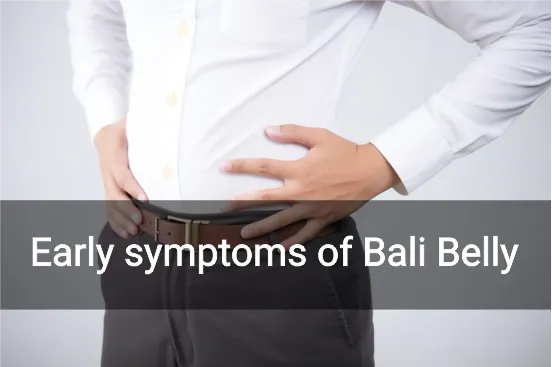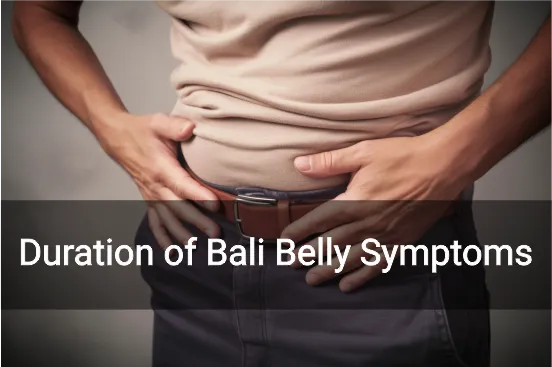When planning a trip to the tropical paradise of Bali, the last thing anyone wants to think about is getting sick. However, Traveler’s Diarrhea a.k.a. Bali Belly Symptoms, is a common ailment affecting tourists visiting Indonesia, particularly the island of Bali. Recognizing and managing the Bali Belly symptoms is crucial for ensuring a comfortable and enjoyable trip. It is possible that you may experience Bali Belly when you have a trip to Bali and so understanding the causes, symptoms, prevention strategies, and treatment options is essential. In this comprehensive guide, we’ll explore everything you need to know about Bali Belly to help you stay healthy during your visit.
Common causes of Bali Belly
Bali Belly is primarily caused by consuming contaminated food or water. The primary sources of infection include bacterial, viral, and parasite. These pathogens can be present in undercooked meat, contaminated produce, and untreated water sources.
Bacterial infections
- Escherichia coli (E. coli): E. coli is a common bacteria found in the intestines of humans and animals. While many strains are harmless, some can cause severe diarrhea, particularly the Enterotoxigenic E. coli (ETEC) strain, which is a leading cause of traveler’s diarrhea.
- Campylobacter: Campylobacter is often found in raw or undercooked poultry, unpasteurized milk, and contaminated water. It can cause diarrhea, abdominal pain, and fever.
- Shigella: Shigella is transmitted through contaminated food or water and can cause severe diarrhea, fever, and stomach cramps.
- Salmonella: Salmonella is found in raw or undercooked eggs, poultry, and meat. It can cause diarrhea, fever, and abdominal cramps.
Viral infections
- Norovirus: Norovirus is highly contagious and can be transmitted through contaminated food, water, or surfaces. It causes acute gastroenteritis, with symptoms such as diarrhea, vomiting, and stomach pain.
- Rotavirus: Rotavirus is a common cause of diarrhea in children and can be transmitted through contaminated hands, objects, or food. Symptoms include severe diarrhea, fever, and vomiting.
Parasites
- Giardia: Giardia is a microscopic parasite found in contaminated water sources. It causes giardiasis, which can lead to diarrhea, gas, and stomach cramps.
- Cryptosporidium: Cryptosporidium is another waterborne parasite that causes diarrhea, stomach cramps, and nausea.

Early symptoms of Bali Belly
The Bali Belly symptoms typically appear suddenly and can be quite uncomfortable. Early symptoms include:
- Sudden onset of diarrhea: Watery, frequent stools are the most common and noticeable symptom. It is essential to stay hydrated and monitor for signs of dehydration, such as dark urine, dizziness, and dry mouth.
- Abdominal cramps and bloating: Intense cramping and bloating may accompany diarrhea, causing significant discomfort.
- Nausea and vomiting: Some people experience nausea and vomiting in addition to diarrhea. This can further contribute to dehydration and electrolyte imbalances, making it even more critical to replenish fluids and electrolytes.
- Loss of appetite: A decreased desire to eat is common during the early stages of Bali Belly. However, it is essential to consume easy-to-digest foods like bananas, rice, soup and toast (BRAT diet) to maintain energy levels and promote recovery.
Additional symptoms
As the illness progresses, some people may experience additional symptoms:
Dehydration
Signs of dehydration include dark urine, dizziness, and dry mouth. Persistent dehydration can lead to more severe complications, so it is crucial to monitor fluid intake and replace lost electrolytes.
Staying hydrated is essential for recovery. Aim to consume small sips of water, oral rehydration solutions, or sports drinks throughout the day.
Fever and chills
A mild to moderate fever and chills may indicate the body is fighting an infection. Over-the-counter medications like acetaminophen or ibuprofen can help reduce fever and alleviate discomfort.
Fatigue and weakness
The body’s energy levels may be depleted due to diarrhea and vomiting. Resting and consuming easy-to-digest foods can help speed up recovery.

Duration of Bali Belly Symptoms
The typical duration of Bali Belly symptoms ranges from 3 to 7 days. Factors affecting recovery time include the individual’s immune system, age, and overall health. Those with pre-existing health conditions, young children, and the elderly may take longer to recover. You can look for medical help if you feel overwhelmed with the symptoms or if symptoms persist for more than a week or if there are signs of severe dehydration, high fever, or bloody stools. All these indicate that you need medical help to administer medical treatment to help you recover.

Prevention strategies
Preventing Bali Belly involves taking precautions with food and water, as well as practicing good hygiene:
Food and water safety tips:
- Consume only bottled or treated water. Avoid tap water, even when brushing your teeth.
- Pay attention to the hygiene of your drinking water
- Eat at reputable restaurants and avoid street food. Look for establishments with high cleanliness standards and proper food handling practices.
- Ensure food is thoroughly cooked and served hot. Pay attention to raw or undercooked meat, seafood, and eggs.
- Wash fruits and vegetables with bottled or treated water before consumption.
Hand hygiene
Washing hands regularly with soap and water or using hand sanitizer can help reduce the risk of infection. Ensure you wash your hands before eating, after using the bathroom, and after touching surfaces in public areas.
Pre-travel vaccinations and medications
Consult a healthcare provider to discuss necessary vaccinations and preventive medications. They may recommend vaccinations for Hepatitis A and typhoid fever.

4 Treatment options
Prompt treatment can help alleviate symptoms and hasten recovery:
- Oral rehydration solutions: Restore lost fluids and electrolytes by consuming oral rehydration solutions, such as Pedialyte or WHO Oral Rehydration Salts. These are available in most pharmacies and can be easily prepared by dissolving the contents in bottled water.
- Over-the-counter medications: Antidiarrheal medications provide short-term relief, but they should not be used for more than 48 hours without consulting a healthcare professional. Antiemetics can help alleviate nausea and vomiting.
- Antibiotics: The main cause of Bali Belly is bacterial infection. Thus antibiotic is the medicine that you need to combat this. Consult a doctor to get the recommendation on which antibiotic to use to cure your specific illness. It is essential to complete the full course of antibiotics, even if symptoms improve, to prevent antibiotic resistance and ensure the infection is fully treated.
- Natural remedies: Ginger and chamomile tea can help soothe the stomach and alleviate nausea. Peppermint oil capsules have also been shown to help reduce abdominal cramping and discomfort. Ensure you consult with a healthcare professional before starting any natural remedies, especially if you are pregnant, breastfeeding, or taking other medications.
Travel insurance and seeking medical help
It is always a good idea to have travel insurance that covers medical expenses when visiting a foreign country. Ensure your policy includes coverage for emergency evacuation, hospitalization, and repatriation. If you need medical assistance while in Bali, seek help from reputable clinics or hospitals that cater to tourists. Your hotel or travel insurance provider can often recommend suitable facilities.
Be prepared with essential information: In case of a medical emergency, have your insurance information, a list of any pre-existing medical conditions, and a list of medications you are currently taking readily available.
Recognizing and managing the Bali Belly symptoms is essential for ensuring a safe and enjoyable trip to Indonesia. Early intervention and proper management can help mitigate the impact of traveler’s diarrhea on your vacation. By adopting safe travel practices, such as adhering to food and water safety guidelines and maintaining good hand hygiene, you can reduce the risk of contracting Bali Belly. In the event you do experience symptoms, knowing the available treatment options and seeking medical help when necessary can help you get back on your feet and continue enjoying your trip.
Remember, while Bali Belly is an unpleasant experience, it should not deter you from exploring the beautiful island of Bali and immersing yourself in its rich culture. With proper precautions and awareness, you can protect yourself and make the most of your Indonesian adventure.
Frequently Asked Question About Bali Belly Symptoms
What is Bali Belly?
Bali Belly, also known as traveler's diarrhea, is a common ailment affecting tourists visiting Indonesia, particularly the island of Bali. It is typically caused by consuming contaminated food or water and can lead to diarrhea, abdominal cramps, nausea, and vomiting.
How can I prevent Bali Belly?
To prevent Bali Belly, follow food and water safety guidelines, such as drinking only bottled or treated water, avoiding ice in drinks, eating at reputable restaurants, and ensuring food is thoroughly cooked.
How long does Bali Belly typically last?
The duration of Bali Belly symptoms usually ranges from 3 to 7 days.
Can Bali Belly be treated with over-the-counter medications?
Over-the-counter medications like antidiarrheals and antiemetics can provide short-term relief. However, they should not be used for more than 48 hours without consulting a healthcare professional.
Are antibiotics necessary for treating Bali Belly?
Considering that bacteria is the most common cause of Bali Belly, then antibiotic is the right option to use. It is essential to complete the full course of antibiotics, even if symptoms improve, to prevent antibiotic resistance and ensure the infection is fully treated.
When should I seek medical help for Bali Belly?
A: You can look for medical help anytime when you have Bali Belly. It is better to get it treated quicker rather than to wait longer for it to get worse.
Can Bali Belly be treated with over-the-counter medications?
Over-the-counter medications like antidiarrheals and antiemetics can provide short-term relief. However, they should not be used for more than 48 hours without consulting a healthcare professional.
Are antibiotics necessary for treating Bali Belly?
Considering that bacteria is the most common cause of Bali Belly, then antibiotic is the right option to use. It is essential to complete the full course of antibiotics, even if symptoms improve, to prevent antibiotic resistance and ensure the infection is fully treated.
Can natural remedies help with Bali Belly symptoms?
Natural remedies like ginger and chamomile tea can help soothe the stomach and alleviate nausea, while peppermint oil capsules may help reduce abdominal cramping. Consult a healthcare professional before starting any natural remedies, especially if you are pregnant, breastfeeding, or taking other medications.
How can I stay hydrated while dealing with Bali Belly?
Consume small sips of water or isotonic water throughout the day to stay hydrated. Monitor for signs of dehydration, such as dark urine, dizziness, and dry mouth, and increase fluid intake if necessary. You can also hydrate your bodies with saline liquid through the IV drip method. For this you need to contact a medical team and consult with them first.




